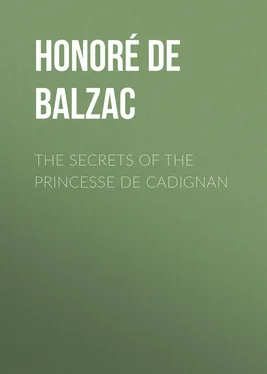Honoré Balzac - The Secrets of the Princesse de Cadignan
Здесь есть возможность читать онлайн «Honoré Balzac - The Secrets of the Princesse de Cadignan» — ознакомительный отрывок электронной книги совершенно бесплатно, а после прочтения отрывка купить полную версию. В некоторых случаях можно слушать аудио, скачать через торрент в формате fb2 и присутствует краткое содержание. Жанр: literature_19, foreign_antique, foreign_prose, на английском языке. Описание произведения, (предисловие) а так же отзывы посетителей доступны на портале библиотеки ЛибКат.
- Название:The Secrets of the Princesse de Cadignan
- Автор:
- Жанр:
- Год:неизвестен
- ISBN:нет данных
- Рейтинг книги:5 / 5. Голосов: 1
-
Избранное:Добавить в избранное
- Отзывы:
-
Ваша оценка:
- 100
- 1
- 2
- 3
- 4
- 5
The Secrets of the Princesse de Cadignan: краткое содержание, описание и аннотация
Предлагаем к чтению аннотацию, описание, краткое содержание или предисловие (зависит от того, что написал сам автор книги «The Secrets of the Princesse de Cadignan»). Если вы не нашли необходимую информацию о книге — напишите в комментариях, мы постараемся отыскать её.
The Secrets of the Princesse de Cadignan — читать онлайн ознакомительный отрывок
Ниже представлен текст книги, разбитый по страницам. Система сохранения места последней прочитанной страницы, позволяет с удобством читать онлайн бесплатно книгу «The Secrets of the Princesse de Cadignan», без необходимости каждый раз заново искать на чём Вы остановились. Поставьте закладку, и сможете в любой момент перейти на страницу, на которой закончили чтение.
Интервал:
Закладка:
“Poor fellow! When a man loves he becomes eminently stupid,” said the marquise.
“Between every act he would slip into the corridor,” continued the princess, smiling at her friend’s epigrammatic remark. “Once or twice, either to see me or to make me see him, he looked through the glass sash of the box exactly opposite to mine. If I received a visit, I was certain to see him in the corridor close to my door, casting a furtive glance upon me. He had apparently learned to know the persons belonging to my circle; and he followed them when he saw them turning in the direction of my box, in order to obtain the benefit of the opening door. I also found my mysterious adorer at the Italian opera-house; there he had a stall directly opposite to my box, where he could gaze at me in naive ecstasy – oh! it was pretty! On leaving either house I always found him planted in the lobby, motionless; he was elbowed and jostled, but he never moved. His eyes grew less brilliant if he saw me on the arm of some favorite. But not a word, not a letter, no demonstration. You must acknowledge that was in good taste. Sometimes, on getting home late at night, I found him sitting upon one of the stone posts of the porte-cochere. This lover of mine had very handsome eyes, a long, thick, fan-shaped beard, with a moustache and side-whiskers; nothing could be seen of his skin but his white cheek-bones, and a noble forehead; it was truly an antique head. The prince, as you know, defended the Tuileries on the riverside, during the July days. He returned to Saint-Cloud that night, when all was lost, and said to me: ‘I came near being killed at four o’clock. I was aimed at by one of the insurgents, when a young man, with a long beard, whom I have often seen at the opera, and who was leading the attack, threw up the man’s gun, and saved me.’ So my adorer was evidently a republican! In 1831, after I came to lodge in this house, I found him, one day, leaning with his back against the wall of it; he seemed pleased with my disasters; possibly he may have thought they drew us nearer together. But after the affair of Saint-Merri I saw him no more; he was killed there. The evening before the funeral of General Lamarque, I had gone out on foot with my son, and my republican accompanied us, sometimes behind, sometimes in front, from the Madeleine to the Passage des Panoramas, where I was going.”
“Is that all?” asked the marquise.
“Yes, all,” replied the princess. “Except that on the morning Saint-Merri was taken, a gamin came here and insisted on seeing me. He gave me a letter, written on common paper, signed by my republican.”
“Show it to me,” said the marquise.
“No, my dear. Love was too great and too sacred in the heart of that man to let me violate its secrets. The letter, short and terrible, still stirs my soul when I think of it. That dead man gives me more emotions than all the living men I ever coquetted with; he constantly recurs to my mind.”
“What was his name?” asked the marquise.
“Oh! a very common one: Michel Chrestien.”
“You have done well to tell me,” said Madame d’Espard, eagerly. “I have often heard of him. This Michel Chrestien was the intimate friend of a remarkable man you have already expressed a wish to see, – Daniel d’Arthez, who comes to my house some two or three times a year. Chrestien, who was really killed at Saint-Merri, had no lack of friends. I have heard it said that he was one of those born statesmen to whom, like de Marsay, nothing is wanting but opportunity to become all they might be.”
“Then he had better be dead,” said the princess, with a melancholy air, under which she concealed her thoughts.
“Will you come to my house some evening and meet d’Arthez?” said the marquise. “You can talk of your ghost.”
“Yes, I will,” replied the princess.
CHAPTER II. DANIEL D’ARTHEZ
A few days after this conversation Blondet and Rastignac, who knew d’Arthez, promised Madame d’Espard that they would bring him to dine with her. This promise might have proved rash had it not been for the name of the princess, a meeting with whom was not a matter of indifference to the great writer.
Daniel d’Arthez, one of the rare men who, in our day, unite a noble character with great talent, had already obtained, not all the popularity his works deserve, but a respectful esteem to which souls of his own calibre could add nothing. His reputation will certainly increase; but in the eyes of connoisseurs it had already attained its full development. He is one of those authors who, sooner or later, are put in their right place, and never lose it. A poor nobleman, he had understood his epoch well enough to seek personal distinction only. He had struggled long in the Parisian arena, against the wishes of a rich uncle who, by a contradiction which vanity must explain, after leaving his nephew a prey to the utmost penury, bequeathed to the man who had reached celebrity the fortune so pitilessly refused to the unknown writer. This sudden change in his position made no change in Daniel d’Arthez’s habits; he continued to work with a simplicity worthy of the antique past, and even assumed new toils by accepting a seat in the Chamber of Deputies, where he took his seat on the Right.
Since his accession to fame he had sometimes gone into society. One of his old friends, the now-famous physician, Horace Bianchon, persuaded him to make the acquaintance of the Baron de Rastignac, under-secretary of State, and a friend of de Marsay, the prime minister. These two political officials acquiesced, rather nobly, in the strong wish of d’Arthez, Bianchon, and other friends of Michel Chrestien for the removal of the body of that republican to the church of Saint-Merri for the purpose of giving it funeral honors. Gratitude for a service which contrasted with the administrative rigor displayed at a time when political passions were so violent, had bound, so to speak, d’Arthez to Rastignac. The latter and de Marsay were much too clever not to profit by that circumstance; and thus they won over other friends of Michel Chrestien, who did not share his political opinions, and who now attached themselves to the new government. One of them, Leon Giraud, appointed in the first instance master of petitions, became eventually a Councillor of State.
Конец ознакомительного фрагмента.
Текст предоставлен ООО «ЛитРес».
Прочитайте эту книгу целиком, купив полную легальную версию на ЛитРес.
Безопасно оплатить книгу можно банковской картой Visa, MasterCard, Maestro, со счета мобильного телефона, с платежного терминала, в салоне МТС или Связной, через PayPal, WebMoney, Яндекс.Деньги, QIWI Кошелек, бонусными картами или другим удобным Вам способом.
Интервал:
Закладка:
Похожие книги на «The Secrets of the Princesse de Cadignan»
Представляем Вашему вниманию похожие книги на «The Secrets of the Princesse de Cadignan» списком для выбора. Мы отобрали схожую по названию и смыслу литературу в надежде предоставить читателям больше вариантов отыскать новые, интересные, ещё непрочитанные произведения.
Обсуждение, отзывы о книге «The Secrets of the Princesse de Cadignan» и просто собственные мнения читателей. Оставьте ваши комментарии, напишите, что Вы думаете о произведении, его смысле или главных героях. Укажите что конкретно понравилось, а что нет, и почему Вы так считаете.












